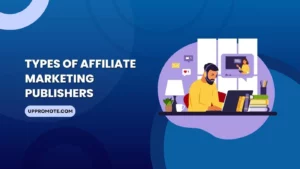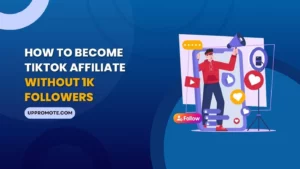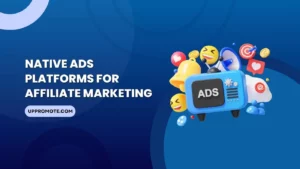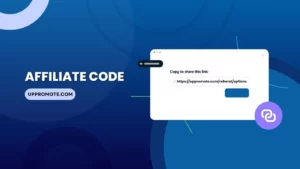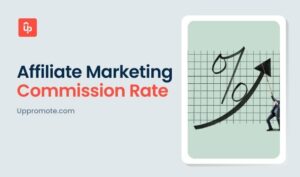The worldwide affiliate marketing business is worth more than $17 billion right now and is expected to double to $27.78 billion by 2027. That’s why many online stores are thinking about starting their own affiliate programs – actually, 81% of them are already doing it!
So, what exactly is an affiliate program, and how can you get started with your own? This beginner’s guide will provide a step-by-step walkthrough on launching your affiliate marketing program. Also, including insights into the challenges and benefits you can anticipate along the way.
What is an Affiliate Program?
An affiliate program is a business arrangement where a store owner (the advertiser) partners with individuals or businesses (affiliates) to promote their affiliate products. The affiliates earn an affiliate commission for each sale or action generated through their promotional efforts.
It’s a fantastic deal for both sides! The store owner gets more sales without spending money upfront, and the affiliate gets to make some extra cash by sharing things they love.
If you’re running an online store and want to start your own affiliate program, think about where your customers hang out online. Are they big on Instagram or Facebook? Do they love reading blogs or watching YouTube? Once you know that, you can set up an affiliate program that fits your audience and helps your business grow.
Affiliate Commission Suggestion Calculator
Suggested maximum commission you can afford based on AOV, COGS, and your desired profit margin.
Recommendation
Based on your cost structure, here is the maximum commission and the "Safe Zone" for your affiliate program.
- Set the "Safe Zone" (60% – 80% of max) as your standard rate.
- Keep the surplus for performance bonuses or seasonal campaigns.
Key Players in Affiliate Marketing
In the world of affiliate marketing, there are two main players: Merchants and Affiliates.
Merchants are basically the sellers. They’re the businesses or folks who have stuff they want to sell, like products or services. They team up with affiliates to help spread the word and get more sales. It’s like having a bunch of friends helping out with advertising, but they only get paid when they bring in actual affiliate sales.
Now, affiliates are the promoters. They’re the ones with blogs, social media accounts, or email marketing lists where they share cool stuff with their followers.
When they team up with merchants, they promote their products or services to their audience. And when someone clicks on their special link and buys something, the affiliate gets a little kickback – like a thank-you for the help.
Five common types of affiliates are:
Social Media Influencers: These are people with lots of followers on platforms like TikTok, Instagram, and YouTube. Find them through influencer platforms or by searching relevant hashtags on social media.
Bloggers: Many blogs cover specific topics, offering personal insights and product reviews. You can find them through Google, social media, or influencer platforms.
Function-Based Affiliates: These affiliates offer services or tools for specific needs, like price-comparison websites or coupon distributors. They might be hard to reach but bring steady traffic.
Agency Partners: Collaborate with agencies experienced in B2B sales to attract business potential customers. Identify happy clients to recruit as partners or use email campaigns to promote your affiliate program.
Email/Newsletter Publishers: Affiliates promote products through newsletters and subscription online content. Ensure content marketing relevance and provide promotional materials like banners and product images.
Both parties get benefits from this deal. Why?
The merchants get more sales, the affiliates earn some extra cash, and enterprise customers get to discover awesome products they might not have found otherwise.
How Affiliate Programs Work
Affiliate programs operate on a performance-based model, connecting merchants and affiliates for mutual benefit. Companies pay individuals, called affiliates, to promote their products or services. When someone buys something through the affiliate’s special link, the affiliate gets a commission.
The company gets more sales without spending on advertising upfront, and the affiliate earns money for promoting products they like.
Tracking and Attribution
In affiliate programs, tracking and attribution are key. Merchants provide affiliates with unique tracking links or codes to monitor their performance. These links and codes help merchants identify which sales or leads are generated through the efforts of their affiliates.
It’s like having a digital trail that ensures affiliates receive proper credit for the sales they contribute to.
Commission Structure
The commission structure is how affiliates earn money through the program. Merchants determine the commission rate or payout that affiliates receive.
This can be:
- A percentage of the sale amount
- A fixed fee per lead is generated
- A tiered structure based on sales volume
It’s essentially how affiliates get rewarded for their affiliate marketing efforts in driving sales and leads for the merchant.
UpPromote, the most comprehensive affiliate & referral marketing app, is regarded as the top-recommended solution for Shopify users. Along with the essential features, it offers advanced dynamic commission rules, including special product commission, lifetime commission, and new customer commission.
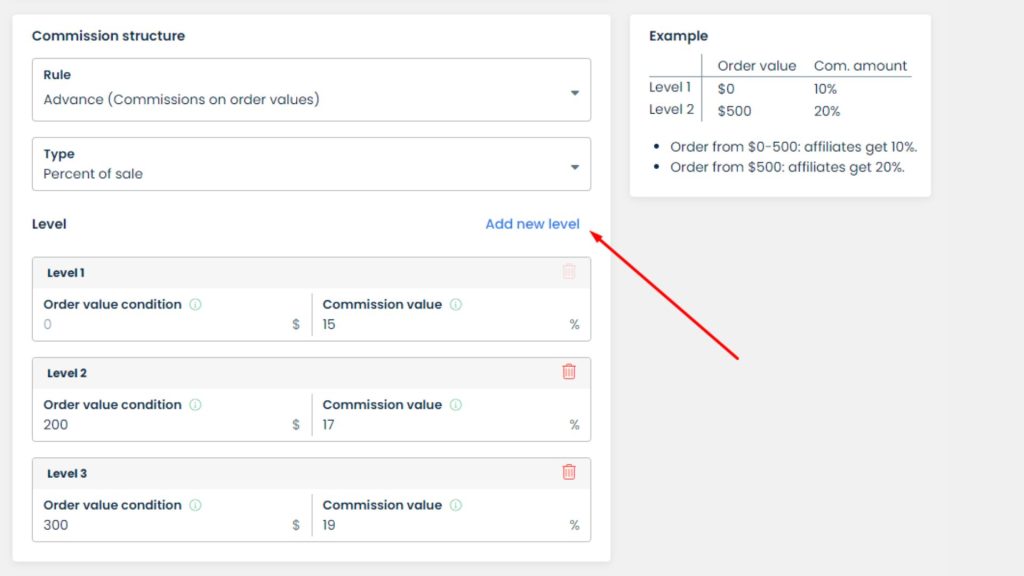
Potential Revenue with Affiliates (UpPromote)
Estimate the potential revenue when you recruit affiliates: comparing Current Business and Business + UpPromote.
Estimated Impact
Quickly visualize how affiliates can boost your orders and revenue.
Revenue Comparison: Current vs. with UpPromote
The chart illustrates relative revenue growth comparing two scenarios: organic sales vs. organic + affiliate-driven sales.
- Affiliate traffic quality is equal to your current traffic.
- AOV and Conversion Rate remain stable.
- Does not account for churn, refunds, or potential upsell/cross-sell.
Program Terms and Conditions:
To ensure everything runs smoothly, merchants establish terms and conditions for their affiliate program. These outline expectations, promotional guidelines, and prohibited activities for affiliates.
In addition to outlining expectations and promotional guidelines, merchants should include clear instructions on how affiliates can promote their products ethically and effectively. This includes guidelines on disclosing affiliate relationships, avoiding deceptive advertising practices, and respecting intellectual property rights.
Merchants may also want to specify prohibited activities, such as spamming, incentivized clicks, or bidding on branded keywords in search advertising.
Providing tips and best practices for successful promotion can help affiliates maximize their efforts while staying compliant with program terms and conditions.
Benefits of Affiliate Programs for Merchants
Let’s discuss why you should begin affiliate marketing. In fact, we’ll give you four reasons why it’s a good idea.
The main aim is to increase sales, but a carefully designed affiliate program can achieve additional benefits.
Increased Brand Awareness and Reach
The trust that affiliates have with their audiences rubs off on your brand. So, when people see respected affiliates speaking positively about your brand, it enhances your brand’s reputation. Affiliate marketing is an excellent way to gather social proof around your brand.
Cost-Effective Marketing
With an affiliate program, you don’t have to worry about hiring a fancy advertising team or spending money on ads. Instead, you let your affiliates do the talking for you by creating content that shows off your products and services.
After you’ve picked your affiliate partners, you can sit back and relax. You don’t have to keep pouring money into marketing efforts if you don’t want to. That’s why so many people love affiliate marketing – it’s simple and effective.
Once you’ve built a good relationship with your affiliates, you can trust them to create awesome content that naturally promotes your business.
The greatest part is: you only pay commissions on sales or leads generated.
No results = no payment.
Targeted Marketing
Another important aspect is that you get to choose the affiliates you work with. This means the traffic they send to your site is from people who genuinely find your product or service valuable.
It’s crucial because the affiliates you select, like content creators and enthusiastic customers who love your brand, likely have their own audience. And chances are, their audience overlaps with yours, making it a perfect match.
Improved Sales and Conversions
The traditional sales funnel operates top-down: you invest more to get more out, flowing in one direction.
But with an affiliate program, you can disrupt this flow by creating a shortcut.
By turning customers into advocates or affiliates generates commission based on sales.
It forms a loop of users becoming customers and advocates, which benefits your business exponentially.
Benefits of Affiliate Programs for Affiliates
We’ve talked about how affiliate marketing benefits businesses, but it’s also a win for publishers. These marketers are often bloggers or social media influencers who craft engaging content. Some even have special affiliate websites focused on promoting digital products and services within a specific niche.
Just like how affiliate marketing helps companies sell more digital and physical products, it’s a fast and effective way for content creators to make money with affiliate marketing from their content.
Monetize Your Online Presence
Being an affiliate marketer can be quite profitable, with Glassdoor reporting an average annual passive income of $66,029. This income can range from $35,000 to $124,000.
Whether it’s a side gig or a full-time job, affiliate marketing offers the opportunity to earn substantial income while promoting products and services you genuinely believe in.
Work from Anywhere
Affiliate marketing is super flexible – you can work full-time, part-time, or freelance, whatever suits you best. All you need is a computer and internet connection to start making money from home. Depending on what you’re into, the time and effort you put in can vary, but you get to call the shots on your schedule.
As an independent affiliate, you can promote various products from different companies, earning cash by recommending stuff you love to your audience. It’s a cool way to make some extra dough online without any fuss or hassle.
Passive Income Potential
Affiliate marketing can be a fantastic way to earn money without constantly putting in effort. Once you’ve set up a good strategy, you can start making cash even when you’re not actively working.
And there’s more to it than just that – joining an affiliate marketing program comes with lots of other great benefits. So, if you’re looking to make money from your website, affiliate marketing is definitely something to think about.
Build Relationships with Brands
As an affiliate, you get to build valuable partnerships that could open doors for you in the future. Affiliate marketing is all about networking and making connections, which can lead to exciting new opportunities.
For example, by partnering with a company as an affiliate, you might impress them so much that they offer you a job as a content marketer. Or, you could meet some important clients through your affiliate work, setting the stage for a successful career ahead. It’s all about making those connections and seeing where they take you.
There are plenty of chances to build a rewarding and lucrative career in affiliate marketing.
As your network and reputation in affiliate marketing expand, so do the opportunities that come your way.
For instance, you might begin as a blogger with a small following, sharing your favorite products, and eventually grow into running a dedicated TikTok channel where you partner with brands for product endorsements.
The possibilities in affiliate marketing are endless, especially when you find top-notch programs in your niche. Aim for quality programs with a proven track record of generating revenue.
Example of Successful Affiliate Programs
Amazon
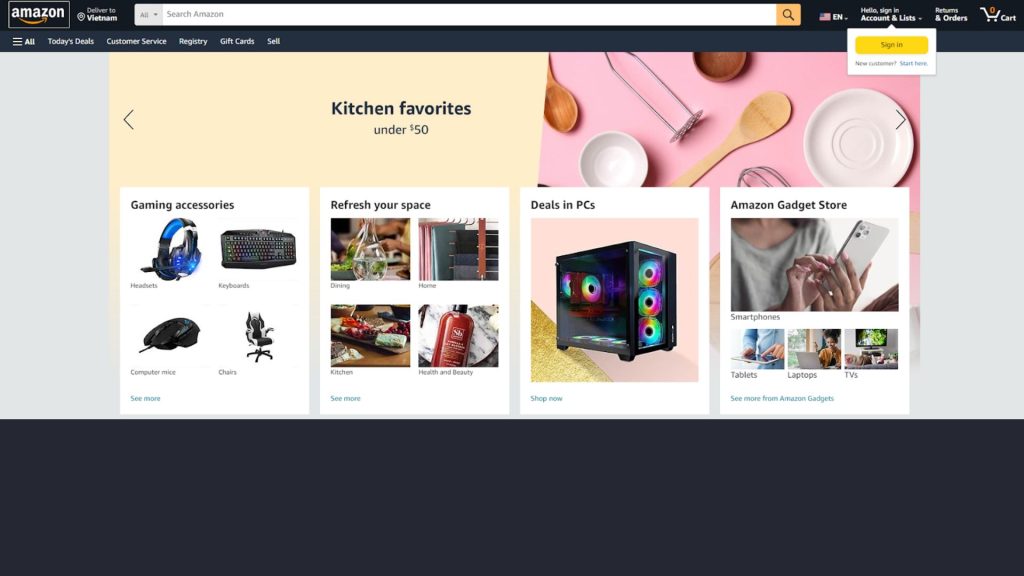
Amazon began in 1994 as an online bookstore by Jeff Bezos. Over time, it became the biggest online store globally, selling everything from electronics and clothes to groceries and digital stuff.
Amazon Associates or Amazon affiliate program allows individuals to earn money by promoting Amazon products on their websites, blogs, or social media marketing platforms.
So what makes Amazon’s affiliate program successful?
Huge range of products: Amazon has lots of stuff. This means affiliates can find products relevant to their audience.
Trusted brand: Amazon is well-known and trusted. Amazon’s brand recognition helps affiliates convert visitors into customers more easily.
Good commission rates: Their monthly commission rate varies by category. Usually, affiliates can earn up to 20% commission on qualifying purchases.
Easy tracking: Amazon gives clear reports on how well you’re doing.
Simple dashboard: Amazon’s site for affiliates is easy to use. So you can easily create referral links, track performance, and access promotional materials.
Marketing Resources: Affiliates have access to a variety of marketing resources and tools provided by Amazon. Including banners, widgets, and product links to help them promote products effectively.
Skillshare
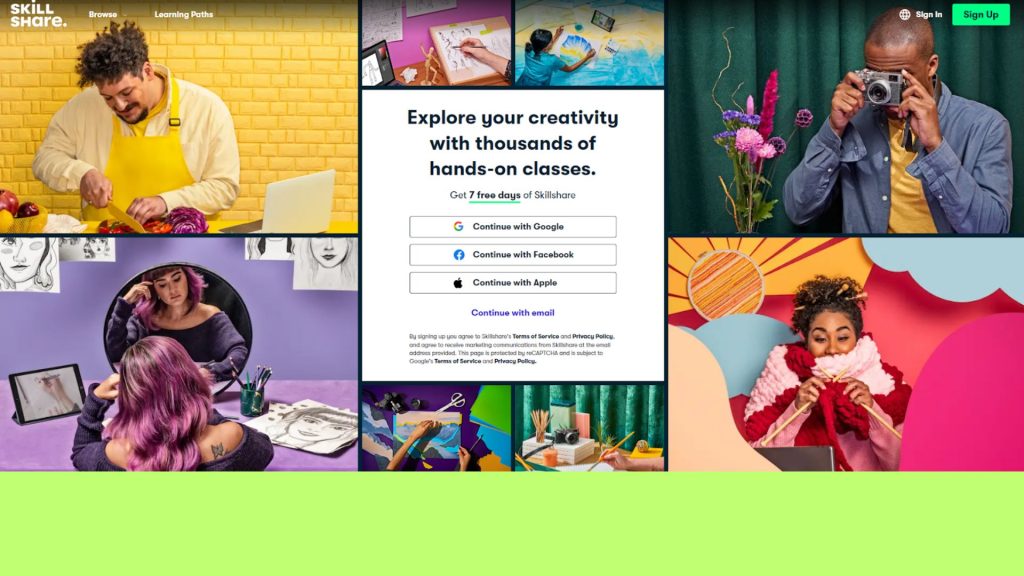
Skillshare is a chest of online learning, filled with thousands of online courses on everything from art and design to business and technology. Their affiliate program lets regular folks like you and me earn money by promoting Skillshare memberships.
The Skillshare affiliate program runs through Impact. If the affiliate refers new customers and they sign up for a paid membership, affiliates will get a sweet 40% commission.
Skillshare’s affiliate program rocks because of a few key reasons:
Diverse Courses: They’ve got a huge variety of courses on all sorts of topics, from design to business. This means there’s something for everyone, making it easier to get people interested.
Appealing Niche: Online learning is super popular, and Skillshare is right in the middle of it. That means there’s a big demand for what they offer, making it easier for affiliates to attract customers.
Generous Commissions: Skillshare pays out a sweet 40% commission for every new member you bring in. That adds up fast, giving affiliates a nice chunk of change.
Easy Promotion: Affiliates can promote Skillshare memberships pretty much anywhere online, whether it’s on your website, social media platforms, or other e-commerce platform. It’s all about finding what works best for you.
Handy Dashboard: Skillshare gives you a personalized dashboard where you can keep track of your traffic, referrals, and earnings in real-time. It’s like having your own control center!
Monthly Goodies: Skillshare keeps things interesting by offering special deals and promotions every month. That gives affiliates something new to share and keeps customers coming back for more.
Cookie Love: When someone clicks an affiliate link, Skillshare gives you a 30-day window to earn commissions from their purchases. That’s plenty of time to reel them in and make some money.
Shopify

Shopify isn’t just a website builder – it’s like your own business partner, helping you every step of the way.
Whether you’re selling handmade crafts or running a big company, Shopify has everything you need to succeed online. They’ve got your back, listening to what you need and making sure you’ve got the tools to make it happen.
With Shopify, you’re not just building a store – you’re building your dream.
The Shopify Affiliate Program welcomes a diverse community of entrepreneurs, teachers, influencers, and creators who share their passion for entrepreneurship with others. By joining for free, you can turn your audience into revenue by referring them to Shopify. With every new merchant you bring in, you earn a commission.
Shopify’s affiliate program stands out as a shining example of success in the affiliate marketing world. Here’s why:
High Demand: As more people start online stores, there’s a big market for Shopify. That means affiliates have plenty of potential referrals.
Trusted Brand: Shopify is a big name in ecommerce, so it’s easier to convince people to sign up when they know and trust the brand.
Generous Commission: Shopify a fixed-bounty of $150 per teachable subscription. Plus, they keep earning as long as their referrals stick around.
Handy Tools: Affiliates get access to tons of tools like banners and tracking links to help them promote Shopify easily.
Support: Shopify’s got your back with dedicated support to help you optimize your campaigns and maximize your earnings.
Amazon, Skillshare, and Shopify’s affiliate programs work well because they offer a variety of products, have a trusted brand, pay good commissions, track sales easily, and provide marketing tools. Merchants should focus on these things to make their own affiliate programs successful.
Where to Find Affiliate Programs
Finding lucrative affiliate offers is essential for a successful affiliate marketing strategy.
So, where can publishers find a good affiliate program?
Merchant Websites
Don’t overlook the obvious!
Many companies advertise their affiliate programs directly on their websites.
Usually, you’ll find a link in the footer that leads to more info about their affiliate program.
You can look for dedicated sections like “Partners” or “Affiliates.” This is a great way to find programs directly from the source and ensure you’re aligned with their brand.
This link might direct you to the sign-up page on their affiliate network or to a page explaining how to become an affiliate.
Amazon is a prime example of this. They have a massive affiliate program called Amazon Associates, which operates exclusively through their own platform. So, if you want to promote Amazon products, you must join their program directly through your Amazon account.
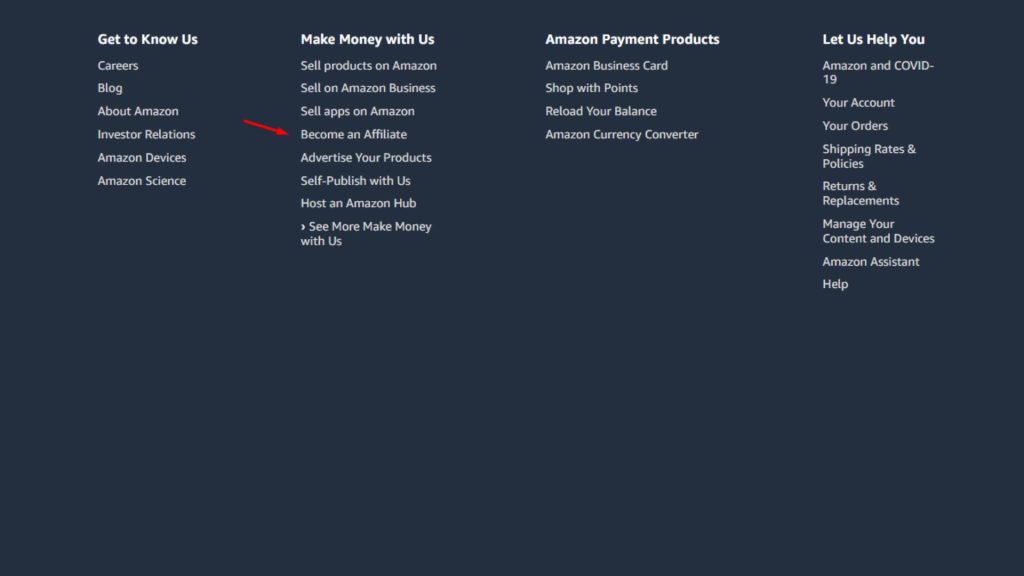
Affiliate Networks
Another way to find companies with affiliate programs, the simplest way is to join an affiliate network.
In the US, popular affiliate marketing networks include:
- ShareASale (now part of Awin)
- CJ Affiliate
- Rakuten Marketing (previously LinkShare)
- ShareASale
- Pepperjam
- AvantLink
- Impact
- LinkConnector
Once you’re signed up, you can start exploring available programs. Look out for companies promoting their programs within the network, as they’re usually easy to find in search results and emails.
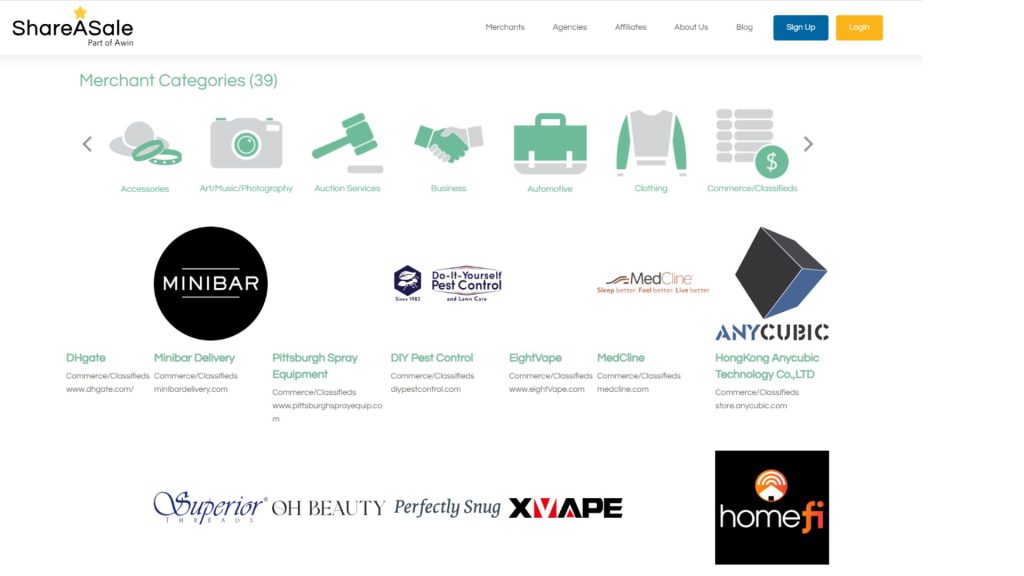
Industry Resources and Blogs
Many industry-specific websites and blogs cater to affiliate marketers. These resources often publish blog posts or articles listing relevant affiliate programs within your niche. This is a fantastic way to discover programs aligned with your expertise and target audience.
Frequently Asked Questions
- How does an affiliate program work?
In an affiliate program, individuals or businesses (affiliates) earn commissions by promoting products or services for a company. They use unique links provided by the company to refer customers. When a purchase is made through their link, affiliates receive a commission.
- Can you really make money being an affiliate?
Yes, you can make money as an affiliate marketer. By promoting products or services through your unique affiliate links, you earn commissions for every sale or action generated through your referrals. With effective strategies and quality partnerships, affiliate marketing can be a lucrative source of affiliate income.
- Do affiliates get paid?
Yes, affiliates get paid commissions for the sales or actions generated through their unique referral links. The amount varies based on the affiliate program’s terms, but affiliates typically earn a percentage of the sale or a fixed amount for each referral.
- What are the 3 main types of affiliates?
Affiliate marketing can be categorized into three types: unattached, related, and involved. Unattached affiliates have no connection to the product; related affiliates have some influence in the niche; involved affiliates have tried and trust the product, building credibility with their audience for greater payoffs.
Last words
Affiliate marketing offers a cost-effective and scalable way to boost your ecommerce website’s revenue. By partnering with other websites and influencers, you can promote your products, expand quickly, and increase sales while enhancing your brand reputation.
Get started with UpPromote to build your affiliate program at zero cost! The tool offers users with various tools to setup, recruit, track and manage your campaign at ease.



